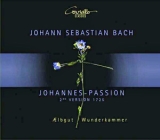 Johann Sebastian Bach: Johannes-Passion BWV 245 (2. Fassung von 1725 in solistischer Besetzung); Benedikt Kristjansson (Evangelist), Felix Schwandtke (Jesus), Ælbgut, Ensemble Wunderkammer; 2 CDs Coviello COV92007; Aufnahme 11/2018, Veröffentlichung 03/2020 (107'13) - Rezension von Remy Franck
Johann Sebastian Bach: Johannes-Passion BWV 245 (2. Fassung von 1725 in solistischer Besetzung); Benedikt Kristjansson (Evangelist), Felix Schwandtke (Jesus), Ælbgut, Ensemble Wunderkammer; 2 CDs Coviello COV92007; Aufnahme 11/2018, Veröffentlichung 03/2020 (107'13) - Rezension von Remy Franck
Die zweite Fassung der Johannespassion von 1725 ist sozusagen die kammermusikalische Ausgabe dieser Komposition, von der es mehrere, aber keine endgültige Version gibt. Gegenüber der ersten Fassung gibt es erhebliche Änderungen: Zu hören ist hier am Anfang nicht der Choral ‘Herr, unser Herrscher’, sondern der Choral ‘O Mensch, bewein’ dein Sünde groß’, den Bach später in der Matthäus-Passion benutzte. Am Schluss steht eine Bearbeitung von ‘Christe, du Lamm Gottes’ aus der Kantate ‘Du wahrer Gott und Davids Sohn’ BWV 23. Auch im Inneren der Passion hat Bach einiges gestrichen, ausgetauscht oder hinzukomponiert.
Die vorliegende Aufführung vereint neben Benedikt Kristjansson als Evangelist und Felix Schwandtke als Jesus die Sänger des Vokalensembles Ælbgut (Isabel Schicketanz, Stefan Kunath, Florian Sievers, Tobias Mäthger, Martin Schicketanz) und die neun Instrumentalisten der Gruppe Wunderkammer.
Bachs Absicht, die Passion weniger pompös werden zu lassen, wird in dieser Aufnahme sehr gut realisiert. Mit flüssigen Tempi, einer angenehmen Dynamik, einem fein differenzierten und detailreichen Musizieren sowie einer übergreifenden Homogenität des Ganzen kommen sowohl die Dramatik der Handlung als auch die Emotionen gut zum Ausdruck. Ich erinnere mich an andere solistisch besetzte Aufführungen anderer Fassungen dieser Passion, die längst nicht so gut funktioniert haben wie diese hier, wo man dank des schlanken und zupackenden Musizierens den großen Chorklang nie vermisst. Im Aufeinanderprallen der Sozialschichten -Jesus, Pilatus und Volk – wird das Passionsgeschehen in seiner ganzen Drastik und Erbarmungslosigkeit deutlich. Meine Hoffnung auf eine optimale Textverständlichkeit wurde allerdings nur teilweise erfüllt. Besonders in den polyphoneren Gesängen ist sie nicht besonders groß.
Evangelist Benedikt Kristjansson singt die Partie des Evangelisten stilsicher mit großer Klarheit und in genauester Wortdeutung. Felix Schwandtke gibt einen sehr charaktervollen, ebenfalls vom Text her gedeuteten, pathosfreien Jesus.
Die Sänger von Ælbgut geben den Arien ein klares, lyrisch intensives oder auch hochdramatisches Profil und finden sich genauso sicher und überzeugend im Chor zusammen.
Das auf historischen Instrumenten spielende Ensemble Wunderkammer überzeugt mit fein nuanciertem, klarem Klang.
Wer also die Johannes-Passion einmal in einer anderen Fassung hören als die, die man gemeinhin vorgesetzt bekommt, und das auch noch in einer musikalisch hochwertigen, durch und durch stringenten Aufführung, der sollte sich diese Interpretation anhören. Sie garantiert eine überraschende Neuentdeckung.
The second version of the St. John Passion from 1725 is, so to speak, the chamber music edition of this composition, of which there are several, but no final version. Compared to the first version there are considerable changes: Here, at the beginning, we do not hear the chorale ‘Herr, unser Herrscher’, but the chorale ‘O Mensch, bewein’ dein Sünde groß’, which Bach later used in the St. Matthew Passion. At the end is an arrangement of ‘Christe, du Lamm Gottes’ from the cantata ‘Du wahrer Gott und David’s Sohn’ BWV 23. Bach also deleted, exchanged or added a number of passages within the Passion.
The present performance reunites Benedikt Kristjansson as Evangelist and Felix Schwandtke as Jesus as well as the singers of the vocal ensemble Ælbgut (Isabel Schicketanz, Stefan Kunath, Florian Sievers, Tobias Mäthger, Martin Schicketanz) and the nine instrumentalists of the group Wunderkammer.
Bach’s intention to make the Passion less pompous is realized very well in this recording. With fluid tempi, a pleasant dynamic, a finely differentiated and detailed music-making and an overall homogeneity, both the drama and the emotions are perfectly expressed. I remember other versions of this Passion with similar small cast, which were far from working as well as this one. Here the great choral sound is never missed thanks to a slender and gripping music-making. In the clash of social classes – Jesus, Pilate and the people – the Passion becomes clear in all its drastic mercilessness. However, my hope for an optimal text comprehensibility was only partially fulfilled. Especially in the more polyphonic songs it is not particularly great.
Evangelist Benedikt Kristjansson sings the part of the Evangelist with great clarity and exact interpretation of the words. Remaining close to the text, Felix Schwandtke gives a very characterful, pathos-free Jesus.
The singers of Ælbgut give the arias a clear, lyrically intense or even highly dramatic profile and find themselves just as confident and convincingly together in the choir.The ensemble Wunderkammer convinces with spirited and finely nuanced playing.
So if you ever want to hear the St. John Passion in a version different from the one you are usually presented with, you should listen to this top notch and thoroughly coherent performance. It comes with the guarantee for a surprising new discovery of the music.
























